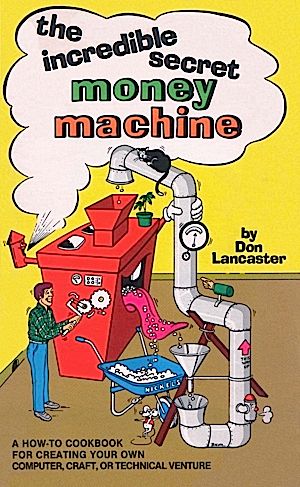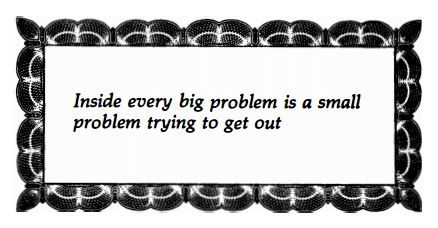Incredible Secret Money Machine

Self-employment how-to
When I first started to get serious about making money I ran into this book written in 1978 by a hippy-hacker living in Arizona. His advice was aimed at “craft and technical” types who wanted to create a small business “doing their thing” whether that was creating ceramic pots, designing outdoor gear, or writing computer code. He talked about doing a starting up before that term was subverted by the implication that your start up would take over the world. Instead the author preached one-person self-employment that made you a living. The concept of entrepreneurism as a small-time life-style has evaporated from the culture, and now entrepreneur and start-up means “get big fast.”
That did not appeal to me then, or now. But making a living doing what I was passionate about did. I learned how to earn a self-employed living from this book, which was mostly about what not to do. (I have been self-employed now for most of my adult life.) A lot of Don Lancaster’s specific examples are now terribly dated, but his core principles still stand and are worth listening to particularly if you are starting out. (If you are already successfully self-employed this book won’t help you much.) His idea that you should aim for a business that grows organically (income > expenses), is a total life-style approach (your business is you), and is dependent on your own value-added rather than market domination is as potent as ever.
If I had to sum up this book in my own words it would be; “If you are willing to build your business on expertise, you can make a living instead of making a fortune — and occasionally the fortune comes anyway.”
Best of all, unlike any other “make-money” book I know of, this one is free. You can read the author’s PDF version of the original paper book.
02/12/13Excerpt

Getting filthy rich should be nowhere in your plans. So long as you can continue doing what you like in the direction you want to go, that's all that should matter. The great irony of your incredible secret money machine is that the less you strive for income, the more of it will come your way, and, more importantly, the more you will be able to do with what you already have. Any time or effort spent directly toward making money is time not available for your main trip. This is wasted time and energy that eventually hurts you rather than helps.
*
As a ferinstance, let's talk about an ordinary piece of typing paper. If you are running an office supply store, you can make a penny on this piece of paper. That penny reflects the difference between the wholesale price and your selling price. Your personal value added here consists of what you put into making your store attractive and in how you relate to your customers. If, instead, you are running a typing service, you can now buy the paper for a penny and sell it for fifty cents or more. Now, you have over fifty times the return since your personal value added consists of putting information on paper just the way the customer wants you to. Things get much better if you make up the words yourself instead of using those somebody else already wants. A medium length story in a larger magazine should pay you several hundred dollars for a dozen or so sheets of paper. This will average out about ten dollars per page, another 20: 1 improvement.
*
Employees are a hassle, a waste of time and a psychic energy sink. You should avoid them at all costs. Your incredible secret money machine should have 0.834 employees -- that is 83.4 percent of you, nothing more,no less. The remaining 16.6 percent of you should go for fun and rewind time. Spend much less time on your money machine and the job will never get done. Much more and you'll be grinding yourself down.
*
But, your money machine will work best of all if it has hundreds or, better yet, thousands of tiny sources of income. There are several good reasons for this. No customer will think he owns you if he is one among unwashed thousands. Customer expectations will also usually be lower since they are probably dealing in a smaller way with you. Better yet, if you can get enough small customers, they will start to obey the statistical laws of large numbers. This means you will be able to predict future sales and cash flow with good accuracy.
Eventually, several of the smaller customers will become bigger ones that take up more and more of your money machine's product. This is fine when it happens, but it is not something you want to aggressively go after when you are starting out The important, even crucial, point is to never let any one customer dominate your money machine to a point where he is in control.
Should you ever end up with one very large customer and many small ones, arrange your money machine and your whole lifestyle to live within the nickels generated by all the smaller sources combined. Force yourself to be independent of the income generated by the biggie. Funnel this extra single-source income into improving your money machine, into the "investments" of the final chapter, or into having fun-but always keep this extra income separate from your bread-and-butter smaller income sources.
*
You should always think of any dollar that goes out your door in terms of the larger number of incoming money machine dollars needed to create it.
I'll define a Reversed Cash Flow, or ReF as any method you could conjure up to cause all of the nickels to head on out exactly In the opposite of the "usual" direction. And preferably end up in your own pocket. Knowing and using relevant and workable ReFs are key secrets to a successful money machine venture. Some ReF examples that have worked for me do Include: Having the Forest Service pay me to stay in a mountain vacation cabin as a fire lookout. Getting paid several hundred dollars a year (or similar perks) for drinking rootbeer every Wednesday night as a volunteer fireman. Forming various clubs and user groups to gain big discounts on all types of new software, hardware, and advance freebie technical info. Getting hired as a sysop on a BBS to pick up free access and actually getting paid a royalty as others call the service. Receiving free toner for testing to yield negative per-page toner costs on my desktop publishing. Or, becoming a developer or an Independent Software Vendor that gives you free or discounted hardware and software.
*
Over the years, I have seen hundreds of examples of money machine people being severely done in by the patent system. Even murdered by it in several heart-attack-during-litigation cases. And not once did I see anyone approaching the patent system on a small scale basis and profiting from it. Ever. Once again: Unless you are well within a Fortune 500 context, any and all involvement in the patent system in any, shape, or form is absolutely certain to cause you the net loss of time, energy, money, and sanity. Besides ending up a totally useless and utterly unnecessary psychic energy sink.
*
Having enough advance financing for your money machine is about the worst possible thing you can do and is almost certain to scuttle the whole machine.
Even when it is up and running perfectly, your money machine at its largest shouldn't have more than a year's income tied up in your total plant and equipment. This one year limit has been called the convivial workplace and forms the dividing line between the good guy or gal craftspersons and the bad guy industrialists.
*
In cash flow accounting, you keep track of how much money comes into your machine and how much goes out, just like a piggy bank. You enter each and every transaction as it happens in some simple way, like writing it on a "cash out" pad. Once a week you do a running balance of your totals. Once a month, you look at your bottom line to see if you are winning or losing. After several months go by, you project your annual returns. You don't count anything for materials unused but on hand, things produced but not sold, the value of the place where you work, or things you have delivered but have not been paid for. This sort of accrual accounting can be important for a large corporation, but will only deceive you if you include these things too early in the game. You should set aside income as it comes up for tax obligations, retirement funds, and other fixed expenses that will be paid out at a later date.
Incredible Secret Money Making Machine Don Lancaster PDF, Free






